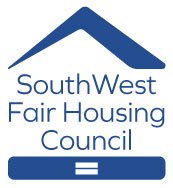Resources
At SWFHC, our mission is to eradicate housing discrimination and support those affected by it in exercising their rights. The information provided on this page will explain the protections offered by the Fair Housing Act.
For additional information and support visit our Helpful Links Section
Download informational PDFs
We offer free Fair Housing education classes to sign up, please click here.
What Are the 7 Protected Classes?
-
The Fair Housing Act is a law that makes it illegal to discriminate against someone based on their race when they are trying to rent, buy, or finance a home.
This means that landlords, sellers, and lenders cannot refuse to rent, sell, or provide financing for a home based on someone’s race.
The law also prohibits other discriminatory practices, such as steering people of a certain race to certain neighborhoods or harassing tenants or their guests based on their race.
If you believe that you have been discriminated against, you can file a complaint here.
-
The Fair Housing Act is a law that makes it illegal to discriminate against someone based on their color when they are trying to rent, buy, or finance a home.
This means that landlords, sellers, and lenders cannot refuse to rent, sell, or provide financing for a home based on someone’s skin color.
The law also prohibits other discriminatory practices, such as steering people of a certain skin color to certain neighborhoods or harassing tenants or their guests based on their skin color.
If you believe that you have been discriminated against, you can file a complaint here. file a complaint here.
-
The Fair Housing Act is a law that makes it illegal to discriminate against someone based on their national origin when they are trying to rent, buy, or finance a home.
This means that landlords, sellers, and lenders cannot refuse to rent, sell, or provide financing for a home based on someone’s birthplace, ethnicity, ancestry, culture, or language.
The law also prohibits other discriminatory practices, such as discouraging or recommending certain communities or housing units based on a prospective tenant or buyer’s national origin, refusing housing to prospective tenants or buyers because they do not speak English, or increasing rent or charging a higher security deposit because a tenant was born in a foreign country.
If you believe that you have been discriminated against, you can file a complaint here.
-
The Fair Housing Act protects people from being discriminated against based on their disability when they are looking for a home.
This means that landlords, sellers, and lenders cannot refuse or limit housing opportunities for people with disabilities.
They also have to allow people with disabilities to request reasonable accommodations and modifications that are necessary for them to use and enjoy their housing.
Examples of reasonable accommodations and modifications include allowing support animals, providing designated parking, or installing grab bars. If you think you have been discriminated against in housing, you can file a complaint here.
-
The Fair Housing Act is a law that protects people from being discriminated against based on their sex.
This means that landlords, sellers, and lenders cannot refuse or limit housing opportunities for people based on their sex.
The law also prohibits other discriminatory practices, such as offering to lower rent in exchange for sexual favors, only showing housing units to prospective tenants of a certain sex, evicting a tenant for being a victim of domestic violence or for calling the police on a domestic abuser.
Domestic violence survivors of domestic and sexual violence often face housing discrimination because of the violence committed against them.
If you think you have been discriminated against in housing, you can file a complain here.
-
The Fair Housing Act protects people from being discriminated against based on their family status when they are looking for a home.
This means that landlords, sellers, and lenders cannot refuse or limit housing opportunities for families with children.
They also cannot designate floors or units of an apartment for families, charge extra rent or a higher security deposit for families with children, or impose occupancy restrictions that limit the number of people who share a room to less than two persons per bedroom plus one.
For example, a 2-bedroom unit may reasonably be occupied by a family of 5. There are exemptions from familial status discrimination for “housing for older persons,” which includes certain senior housing facilities and communities.
If you think you have been discriminated against in housing, you can file a complaint here.
-
The Fair Housing Act makes it illegal to be treated unfairly when you look for a home because of your religion.
This includes what you believe, how you dress, and how you worship. This protects both those who practice a religion, and those who do not practice any religion”
For example, you cannot be:
· Shown or not shown homes near or far from a place of worship
· Stopped from putting religious items in your home
· Stopped from using common spaces for religious activities, if others use them for non-religious activities.
If you think you have been discriminated against in housing, you can file a complaint here.
-
There are additional protections throughout Arizona, such as source of income, ancestry, age, marital status, creed, and more. Please contact SWFHC for more information.
Fair Housing Public Information | PDF Downloads
Fair Housing Rights of Persons With Disabilities to Reasonable Accommodations for Assistance Animals
An assistance animal, distinct from a pet, provides vital support or performs tasks for individuals with disabilities, including emotional support. Housing providers must accommodate such animals without imposing pet-related restrictions or fees, and can only deny them in specific, reasonable circumstances like direct threats or significant property damage.
Fair Housing for Families with Children
Familial status in fair housing law refers to the presence of children under 18 in a household, including pregnant women and those in the process of adoption or custody. The law prohibits housing discrimination based on familial status, like denying or limiting access to housing, or applying different rules because of children.
Fair Housing Rights of Persons Who Are Deaf or Hard of Hearing or Who Aare Blind or Have Low Vision
A "reasonable accommodation" is a necessary change to a rule, policy, or service that allows a person with a disability equal access to housing. A "reasonable modification" involves structural changes to a dwelling for disability access, typically at the resident's expense, unless federally funded housing is involved.
Fair Housing Rights of Persons With Disabilities
Housing providers cannot refuse to rent based on assumptions about safety or self-care, except if tenancy poses a direct, significant threat not mitigated by reasonable accommodation. "Reasonable accommodations" are necessary changes to rules or services for equal housing access. Providers may verify disability and the need for accommodation or modification, but cannot inquire about the disability's nature or severity.
Fair Housing Guidance for Condominium, Cooperative and Homeowners’ Associations
The federal Fair Housing Act, prohibits discrimination in housing transactions due to race, color, religion, national origin, sex, disability, or familial status, this also applies to condominiums, cooperatives, and homeowners’ associations. These associations, along with landlords, real estate agents, lenders, and insurance companies, are required to avoid discrimination in rentals, sales, mortgages, appraisals, and insurance based on protected characteristics.
Real Estate Sales Discrimination
Housing discrimination takes many forms, from steering buyers to certain neighborhoods based on race to refusing offers and services based on disability or family status. These often subtle practices perpetuate inequality and limit access to fair housing for diverse communities.
Fair Housing Rights of Service Members and Veterans
This brochure offers insights into the fair housing rights of veterans and individuals with disabilities, highlighting that of the 19.6 million military veterans in the U.S., about 28% have disabilities, including nearly 20% with service-related disabilities. It also covers key information on the necessary reasonable accommodations and modifications to support their housing needs.
Responding to Criminal Civil Rights Violations
The Fair Housing Act forbids criminal acts like assault, homicide, arson, threats, or vandalism that harm, intimidate, or interfere with individuals exercising their fair housing rights. These acts are motivated by hate or bias based on race, ethnicity, nationality, religion, gender, sexual orientation, or disability, constituting criminal civil rights violations. Indicators of such hate activities include biased language, victim perceptions of targeted attacks, patterns of similar incidents, activities of hate groups, and the timing of the crime related to significant dates for protected classes.
What is a Source of Income (SOI) Protection?
Discover the impact of the newly implemented Source of Income (SOI) Protection ordinances in Tucson, Phoenix, and Tempe. This ordinance ensure that individuals are not discriminated against based on their income sources, whether it's through wages, housing vouchers, disability benefits, or any other legal means. How do these changes promote fairer housing practices and broaden housing opportunities?
Helpful Links
Housing Discrimination
The Federal Fair Housing Act, also known as Title VIII of the Civil Rights Act of 1968, and its subsequent amendments, establishes crucial protections against housing discrimination. It prohibits discriminatory practices in the sale, rental, financing, and other housing-related transactions. Specifically, discrimination based on race, color, national origin, religion, sex, familial status (including children under 18 and pregnant women), and disability (or handicap) is strictly prohibited. These provisions ensure equal access to housing for all individuals.
A Manual to assist designers, builders, property owners, and landlords in meeting accessibility requirements of the Fair Housing Act
Mobile Homes
Arizona has a separate "Act" specifically for mobile homes called the Arizona Mobile Home Parks Residential Landlord & Tenant Act. This Act governs the rights and responsibilities of landlords and tenants in mobile home parks.
Please note that according to §33-1432(G) of the Arizona Mobile Home Parks Residential Landlord & Tenant Act, prior to entering a rental agreement, landlords are required to provide each prospective tenant with a concise written summary of the Act approved by the Director of the Department of Fire, Building & Life Safety.
Landlord Tenant Legal Resources
Arizona Tenants’ Rights and Responsibilities Handbook
Both the landlord and tenant have legal obligations when entering a contract with one another. Details tenant’s rights and responsibilities and provides tips on best practices. To request a copy call Community Legal Services, Inc. (602) 258-3434
Arizona State Legislature – Database of official laws and statutes.
Resources for legal questions across Arizona intended to promote justice and self-advocacy.
General Arizona landlord/tenant information
Helping you find affordable housing in Pima County
Pima County Housing Search - Tenant Tools
Helpful tenant checklists and tools to aid you in your housing search
Forms for Tenants
Below is a link to the Arizona Tenants' Right and Responsibilities Handbook which contains standard forms that may be of use if you are a tenant experiencing various housing issues. Copies of these forms are also located within the document beginning on page 32.
Arizona Tenants’ Rights and Responsibilities Handbook
To request a copy call Community Legal Services, Inc. (602-258-3434 extension 2230)
Helpful Contacts
The Landlord and Tenant Program provides educational services and information to landlords and tenants by telephone at (602) 262 7210. Please have the following items available when you call for an appointment.
Lease agreement
Copies of all notices served by either party
Any other documents pertaining to your landlord/tenant situation
Proof of rental payment
Southern Arizona Legal Aid (SALA)
SALA provides free legal services to people with limited financial means who qualify.
(520) 623-9465 or (520) 623-9461
Pima Council on Aging (PCOA)
PCOA’s mission is to promote dignity and respect for aging, and to advocate for independence in the lives of Pima County’s older adults and their families.
(520) 790-7262
What Kinds of Cases do Civil Courts Handle? Property disputes including housing – such as eviction or foreclosure.
Phoenix Office: (602) 258-3434
Mohave and La Paz Counties: (928) 681-1177
Yavapai County: (928) 445-9240
Yuma County: (928) 782-7511
San Luis: (928) 627-8023
Volunteer Lawyers Program: Arizona
The Volunteer Lawyer Program (VLP) for Pima County offers self-help clinics, court projects, and direct representation. Also offered in other Arizona Counties. (800) 640-9465
Arizona Statewide Independent Living Council
The Council participates in developing, monitoring, and reviewing the triennial State Plan for Independent Living (SPIL), which is implemented by the AZSILC administrative team, in collaboration with the five Centers for Independent Living (CILs) in Arizona. Call AZSILC at (602) 262-2900
Statewide organization dedicated to providing low- and moderate-income individuals and families an opportunity to obtain quality, affordable housing through both rental and home-buyer support programs. (520) 318-0993
Free legal aid Arizona organizations that assist and provide legal representation to those who meet their criteria.
Maricopa County Bar Association Lawyer Referral Service
Lawyer referral service that helps match clients with attorneys that fit their needs. (602) 257-4434
The Attorney General's Office represents and provides legal advice to most State agencies; enforces consumer protection and civil rights laws; and prosecutes criminals charged with complex financial crimes and certain conspiracies involving illegal drugs. In addition, all appeals statewide from felony convictions are handled by this Office.
Phoenix (602) 542-5025
Tucson (520) 628-6504
City of Tucson: Housing and Community Development Department
Resources for code enforcement, housing management, and Section 8/Housing Choice Voucher assistance. (520) 791-4147
City of Phoenix: Equal Opportunity Department
Ensures compliance of laws regarding fair housing, employment, disability, public accommodations, and community relations/services. (602) 262-7716











